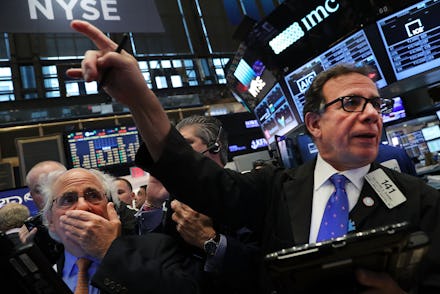Here's why stocks shot up — even though Donald Trump won the presidential election

On election night, as President-elect Donald Trump's victory unfolded, futures on the Dow Jones plunged more than 800 points in after-hours trading. S&P and Nasdaq futures fell far enough to trigger a halt in trading.
But by market close on Wednesday, the indexes were up — and the Dow Jones had actually hit a record high.
And there was tons of trading Wednesday. Free brokerage firm Robinhood saw a huge spike in volume of activity: trading increased by more than 90%, net deposits by 113%, and new account applications by 71%, according to the company.
Why — despite mixed signals in the morning — was it apparent by midday that investors felt optimism about Trump's win?
Here are three big reasons the markets were so much less despondent than Twitter the day after the election.
Investors hope Donald Trump's ideas about infrastructure will help the economy.
Rebuilding the nation's infrastructure has been a key part of Trump's promises. And he returned to the theme in his acceptance speech on election night.
"We are going to fix our inner cities and rebuild our highways, bridges, tunnels, airports, schools, hospitals," he said in the victory speech. "We're going to rebuild our infrastructure, which will become, by the way, second to none. And we will put millions of our people to work as we rebuild it."
In response, Treasury yields shot higher and infrastructure stocks made gains.
Equipment maker Caterpillar jumped 7.70%, Vulcan Materials shot up 9.8% and Jacobs Engineering Group went up 9.8% Wednesday. Financial companies like Goldman Sachs and JPMorgan Chase also climbed.
It didn't hurt that Democrats seemed onboard for infrastructure spending.
And infrastructure is just one part of what the markets saw in a Trump future today. Private prison stocks and drug stocks went up, too.
These rose likely because Trump's administration would need to place people in prisons before deporting them — and because the drug industry had been skittish about a Clinton win, given the threat she might try to curb drug prices.
Donald Trump plans to slash corporate taxes.
One of the reasons why markets are spiking on the news of Trump's election is his plan to convince companies to bring money they've got stashed overseas back to the U.S.
There are two main ways he wants to do this: The first is simply by lowering corporate taxes.
The second is a one-time tax holiday, which means that companies could forgo owed taxes if they bring them back into the U.S. for reinvestment.
Wall Street has been enthusiastic about this idea since Trump first floated it back in August, with analysts describing it as the most "efficient" way to bring back some of the $2.5 trillion that's been stashed overseas as a means of tax avoidance.
The market doesn't think a trade war is likely.
Overall, a consensus is beginning to emerge that the market is focusing on the positives when it comes to Trump's presidency rather than weighing the negatives — at least at this early stage.
There's increasing hopefulness that Trump is unlikely to actually start a trade war, something many economists feared — and something which Congress wouldn't necessarily be able to stop him from doing.
Proponents of this theory suggest that Trump is more bark than bite: One clue they point to is Trump's own book, the Art of the Deal, where he writes that he will sometimes "settle for less" than what he originally wanted.
Another clue is the language Trump used in Mexico, despite his inflammatory rhetoric — calling the Mexican president a "friend" and seeming to dial back some of his previous pronouncements that he would build a border wall and make Mexico pay for it.
Mostly, it seems, markets just wanted certainty about what would come next.
Of course, markets are also notoriously prone to overreaction, and just because investors seem to like Trump now, doesn't mean they'll like him forever.
That's particularly given the many lingering uncertainties about what his full platform might look like, particularly when it comes to foreign policy.